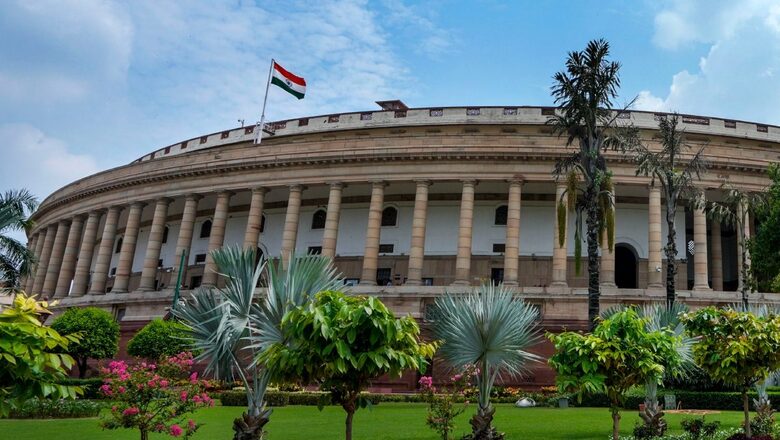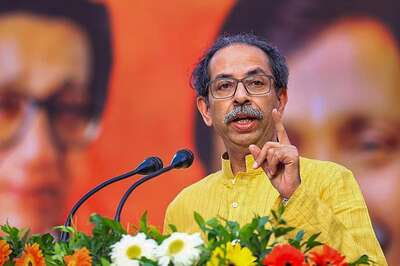
views
The Opposition has given a no-confidence motion in the ongoing monsoon session of Parliament. And along with that it is trying its best to not allow both houses of Parliament to function. The house has been witnessing slogan shouting, walk-outs, and members wearing black dresses. Is this the Indian parliamentary tradition? Is there a benchmark for parliamentary debates on the ‘No-Confidence motion’? And if so, what is that benchmark?
This benchmark was set up as early as 1963 during the four-day debate on the first no-confidence motion moved in Parliament. There is an interesting similarity despite these two motions being moved with a time gap of almost six decades.
The Lok Sabha used to have 494 seats at that time. Indian National Congress had an overwhelming majority with 361 seats that it had won in 1962 polls. The Communist Party of India had 29 seats, followed by Swatantra Party (18), Bharatiya Jana Sangh (14), Independent (20) and others (52). So the Opposition knew that it was going to be defeated and yet it moved the No-Confidence motion. A similar situation exists right now.
But this is the only similarity that we can draw between these two motions. The Opposition moved the n-confidence motion in 1963 to highlight its concerns about defeat in the war against China, corruption, rising prices, India’s fledgling foreign policy, illegal migration of Muslims from across the border in Assam and Hindu genocide in Pakistan. There was no slogan shouting, no one from the Opposition jumped into the well, there were no black clothes. The Opposition debated intensely for four days with members of treasury benches as well as Opposition trading charges and counter-charges. There were interjections also but no-one disrupted the proceedings of the parliament. The Opposition members came out with some of the finest speeches led by Acharya JB Kriplani and followed by MR Masani, Prakashveer Shastri, UM Trivedi among many others. The Opposition never demanded that the Prime Minister Jawahar Lal Nehru should come out with a statement before any debate even starts. From the treasury benches, a number of Lok Sabha MPs put up a spirited defence of the Nehru government. They included A.P. Jain, Subhadra Joshi, Seth Govind Das, Thirumala Rao, Bakar Ali Mirza and Ravindra Varma among others. Prime Minister Nehru replied to the debate on 22 August, 1963.
The motion was filed on 13 August, 1963. Seven Opposition members had moved individual no-confidence motions. Five of them withdrew their individual motions in favour of the no-confidence motion moved by Acharya Kriplani. One of the motions could not get 50 votes when put to voting and hence was not taken up for discussion. Finally, it was Acharya Kriplani’s motion, which got more than 70 votes, that was accepted for the debate. The motion read, “… This House expresses its want of confidence in the council of ministers.”
The debate started with Acharya Kriplani making a fiery speech. Interestingly, as soon as he started the speech, some Communist Party members led by Indrajit Gupta tried to interrupt. In fact, Gupta, raised a point of order that Acharya Kriplani’s motion should be rejected on technical grounds. But the Speaker overruled these objections and allowed Acharya Kriplani to kick-off a debate with a scathing attack on the Nehru government.
Some members of the Congress Party tried to interject while the Opposition members put forward their viewpoints over the next few days but there was no slogan shouting from the Opposition and the debate was of high quality.
One of the most significant aspects of this debate was that several Opposition members not only attacked the Nehru government but they also gave a number of constructive suggestions to improve the functioning of the government. They highlighted gaps in the five-year plans that were the hallmark of the Nehru government and also questioned the principle of non-alignment which formed the fulcrum of Nehru’s foreign policy. While the Opposition was relentless in taking on the government, there were no personal attacks. This despite the fact that some Congress members mounted personal attacks on Acharya Kriplani accusing him of moving from one camp to another with the sole aim of targeting Nehru.
But overall the debate was of the highest quality despite being a no-holds barred offensive from both sides. Unfortunately, that spirit seems to be missing in the way Opposition is using the tool of no-confidence motion now.
One should also remember that the first no-confidence motion was moved by the Opposition within a year of the 1962 general elections. It was clear that the intent was to highlight the fallacies of the government not to score brownie points for electoral victory but to compel the Nehru government to do the course correction. However, the Opposition has moved the current no-confidence motion, around 10 months before the general elections are due in 2024. In 2018 also, the Opposition had moved the no-confidence motion in the run-up to the Lok Sabha elections of 2019.
It appears that the present day Opposition’s tactics in Parliament are focused more on gaining electoral ground in the forthcoming elections rather than improving the governance so that common people can get a better deal from the present-day government. Perhaps, the Opposition needs to go back and look at our parliamentary traditions and do the course correction for itself. Parliamentary debates are not a tool for grabbing power but they are meant to be an effective tool to improve governance as a continuous process. And the Opposition is supposed to play an important and constructive role in this regard.
It is time for the Opposition to learn from the iconic statement of late Prime Minister Atal Bihari Vajpayee that he made in his May 1996 speech, “Satta ka to khel chalega, sarkaren ayyengi, jayengi; partiyan banegi, bigedgi; magar ye desh rahna chahiye, is desh ka loktantra amar rahna chahiye (The power game will go on, governments will come and go, parties will come into existence and vanish, but this nation should remain, this country’s democracy should live eternally).”
The writer, an author and columnist has written several books. He tweets @ArunAnandLive. Views expressed in the above piece are personal and solely that of the author. They do not necessarily reflect News18’s views.




















Comments
0 comment